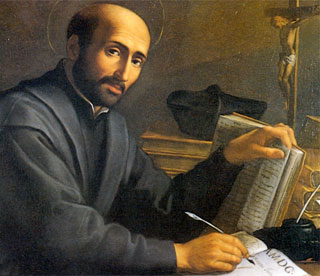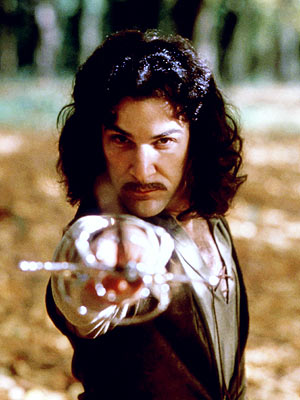
St Ignatius Loyola
If we live in the Spirit, let us also follow the Spirit — Galatians 5:25
One of the greatest conversion stories in the history of the modern church is that of St Ignatius Loyola.
Iñigo was a soldier.

Prepare to Die!
Not Inigo Montoya. Iñigo López de Loyola.
Iñigo’s conversion began after a cannon ball crushed his leg at the Battle of Pamplona (Pamplona is where they celebrate the annual “Running of the Bulls” — Spaniards are tough! Iñigo was a Basque; Basques are crazy). Sitting around bored all day in a hospital bed, Iñigo had plenty of time to read. The only books they had on hand at the hospital were lives of the saints.
Iñigo would have never picked up a book on saints were he not completely bored out of his skull. Providentially, these books changed his life. Headstrong Iñigo was determined to become a saint.
The man we now call St. Ignatius Loyola went on to found one of the most influential religious orders of priest in the Church, namely, the Society of Jesus, commonly known as the Jesuits.
Perhaps St Ignatius’s greatest contribution to the Church, in terms of spirituality, is the Spiritual Exercises. During a personal retreat in a cave in Manresa, Spain, where he spent several days in prayer purifying his soul of “inordinate attachements” and seeking God’s will for his life, Ignatius conceived the Spiritual Exercises as a method of contemplation and discernment. The exercises are divided into four weeks of guided meditation: Principle and Foundation (meditations on the Eternal Truths); The Life of Christ; The Passion of Christ; Resurrection of Christ. He called them exercises, because:
For just as strolling walking, and running are bodily exercises, so spiritual exercises are methods of preparing and disposing the soul of all inordinate attachments, and after accomplishing this, of seeking and discovering the Divine Will regarding the dispositions of one’s life, thus insuring the salvation of his soul.
According to this approach, two key principles for finding God’s will in one’s life are purification and discernment. Purification is necessary to free the soul from attachment to sin and to be open to the movements of the Holy Spirit in order to allow Him to work more effectively in one’s life. Once the soul is purified, it is in a better state to listen to God’s voice and discern his will with clarity.
Seek and you will find: whoever does the spiritual exercises in a spirit of freedom, openness, and generosity will hear God’s voice — it’s guaranteed. Anyone who has done them well will tell you that it is one of the most profound spiritual experiences and life changing events of a lifetime.
Are there risks?
Yes. If you are not prepared to do them properly — for any reason — you could end up wasting your time. If your are not disposed to be completely honest with yourself and with God, you could end up hurting yourself and damaging your life, in the longrun. That is why it is important to do the exercises with an expert spiritual director schooled in discernment of spirits. One of the principles I find most helpful in discerning spirits is the following. Not every inspiration is from God.
St. Ignatius warns us that the devil does not always tempt us to do evil things. He knows better than to tempt us, out of the blue, to rob a bank. His aim is to distract us or keep us from doing God’s will. If we are seeking to do what is right, he will present us with several appealing options, though not the ones God wants for us. Jesus had this experience while praying for 40 days in the desert and he found out that even the Devil can quote scripture.
Let not your hearts be troubled!
The secret to outwitting the tempter is not to outwit him but to pray well (though sometimes you just have to tell him to go to hell; Ignatius explains that too). According to Ignatius, we have to pray with the whole person: mind, will, and affections, i.e., with the heart. At the end of a meditation, we have to take note of the “movements of the soul,” in order to reap the fruit of the prayer. Afterward, we have to discuss these movements of the soul with a spiritual director, who will often recommend that we reconsider these “movements” in prayer again, as a sort of repetition of the prayer.
If the prayer is done well, there will be moments of joy and moments of sadness, consolation and desolation. For discernment purposes, life affecting decisions should only be made when the following 3 conditions are met:
- The soul must be at peace;
- In a state of consolation;
- Having received some recognizable form of confirmation in prayer.
In short, the prayer should bring us certainty. If that does not happen, we need to keep praying until God gives us the certainty we are seeking. Once we have that certainty, we must commit ourselves to fulfilling God’s will with absolute confidence.
Commit your way to the Lord; trust in him and he will act — Psalm 37:5
“My name is Inigo Montoya you killed my father…” lol! I learned a lot from this post -thanks!
Everyone’s favorite line from America’s favorite movie from the 80’s. I couldn’t resist alluding to “The Princess Bride.”
I’m glad you found the rest of it helpful. God bless!
Love the Inigo picture! 🙂
I also like the warning you gave about finding a good spiritual director to be able to do these exercises, and the boiling it down to purification and discernment. The exercises are very demanding for those who have no idea about spiritual battles, and unfortunately there are many spiritual directors who avoid the purification part, wanting to skip right into discernment, leaving many unarmed…
Thank you for this beautiful post about this great Saint!
Thanks for the comment. Good observations you made here about having a good spiritual director.
A good spiritual director aids with objectivity. Objectively, we are weak creatures, with limited powers of reasoning and wounded by the effects of sin. Therefore, sanctifying grace is obviously a key element — an absolute necessity. A wise spiritual director who’s in tune with the Holy Spirit adds stability and aids with objectivity. The analogy of a three-legged stool is fitting here. If one of the legs is missing, the stool won’t stand. Three elements of objectivity in spiritual exercises are: (1) The work of the Holy Spirit; (2) a well disposed soul; (3) a wise, experienced spiritual director.
Interesting… St. Francis de Sales gave me a similar formula in the Introduction to the Devout Life, (he was a Jesuit, I think); he says the director must be filled with love, learning (knowledge), and prudence (discretion), which is about the same as what you said. To me, that means he must know the teachings of the Church, must know how to apply those according to the disposition of the soul he is dealing with, and he must do all with love. I guess why I picked up on that is that I have had some doozies in my life, so I am always looking for things that help me discern who will actually guide me in the right direction. Thank you for your insight and for passing on your knowledge! God bless!
“The secret to outwitting the tempter is not to outwit him but to pray well (though sometimes you just have to tell him to go to hell; Ignatius explains that too). ”
This is a gem.
Glad you liked it, Marcy. God bless!
Hello, Marcy. I just wanted to let you know how much I appreciate your blog and your readership on Biltrix. I nominated you for the Reader Appreciation Award: https://biltrix.com/2012/08/01/reader-appreciation-cause-youre-the-best/. (FYI… I know your posts are usually closed to comments, but part of the rules of my receiving the award are that I have to inform you with a link to the article, which is what I’m doing here). God bless!
Well, thanks! I’ll get around to the acceptance once I figure out who I would nominate.
Brilliant Post!
Just wanted you to know how much I appreciate you guys and the blog
http://waltbrite.wordpress.com/2012/07/31/reader-appreciation-award/
Thanks so much, Walter! The appreciation is mutual. I’ll perform the public duty, i.e., the gratitude/acceptance post, real soon.
Beautiful Quote from the Psalms!!
Thank you, Catholic Salmon! I hope it’s okay for me to mention here that I had a hard time commenting on your blog yesterday, for some reason. So I will just say it here. I really liked your series on reconciliation, especially the historical part (i.e., part II). Very helpful. God bless!
Don’t understand why there’d be a problem…thanks for bringing it to my attention. Glad you enjoyed the posts.
This is my first visit to your site and I Love this post. I’ve always thought of the spiritual exercises as stuff for holier souls than I am but without realizing it I guess I pray this way most of the time. Thank you for opening my eyes – this is necessary stuff for any of us seeking to do the will of God.
Looking forward to more gems on Biltrix!
Thanks for the comment! So glad you liked it and found it useful. I’m looking forward to following your “Godversations” as well. God bless!